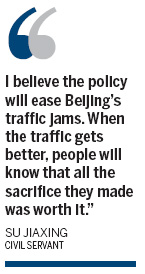Top Stories
More buses and trains needed for staggered rush hour plan
By Meng Jing (China Daily)
Updated: 2010-04-12 08:21
 |
Large Medium Small |

As many as 800,000 commuters in Beijing will change their rush hour schedules as the new adjusted-work-hour policy kicks off on Monday.
The new policy, which applies to most government administrations in Beijing including the police, the traffic control departments and the civil affairs departments, will lead to a half-hour postponement of their working hours.
These public organizations will replace their former open hours from 8:30 am to 5:30 pm with the new working hours of 9 am to 6 pm.
Beijing Subway Company spokesman, Jia Peng, welcomed the new policy, believing it will benefit the underground public transportation system.
"We believe it will extend the rush hours and ease the current crowd situation on the subway," Jia told METRO on Sunday.
He added that the Beijing Subway Company will examine any changes in rush hour passenger numbers brought by the new policy and adjust its operation plans accordingly.
"We are considering adding more trains if the rush hours are extended," he said.
Beijing Bus Company is also ready to embrace the change by adding more buses, according to Beijing News on Sunday.
The company said the policy would change its current rush hours and has decided to add more buses during peak times.
Buses in suburban areas will arrive every four minutes instead of the current five minutes.
In the downtown areas, the frequency will increase from every three minutes to every two minutes. For busy routes like Route 1 and Route 300, the interval between buses at rush hours will be reduced to 1.5 minutes.
The adjusted-work-hour policy is just one part of the government plan to ease the capital's chaotic transport system during rush hours. However, some commuters involved in the change of schedule are reluctant to accept it, especially those who need to send and pick up their children at schools.
"Some of my coworkers do have problems with the new policy, because they usually send their children to schools before 8 am. They have no idea how to spend the rest of their time before going to work at 9 am," said Su Jiaxing, a civil servant from the water conservation office in Dongcheng district.
But Su, who drives around 20 minutes to work every day, believed that the new working hours would bring more advantages than disadvantages.
"Every coin has two sides. I believe the policy will ease Beijing's traffic jams. When the traffic gets better, people will know that all the sacrifice they made was worth it," he said.







